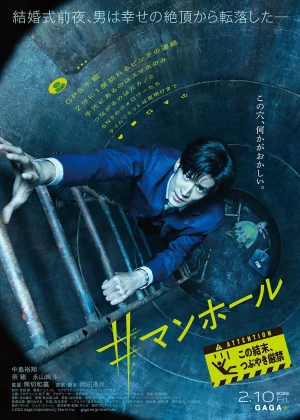#Manhole
Movie details

Kazuyoshi Kumakiri is quite the underrated director, so when #Manhole [#Manhōru], his most recent feature, played at a nearby film fest, I figured it would be safe to put in the effort. And I certainly wasn't disappointed. It's a return to core genre films for Kumakiri, who had shifted his focus to more drama-oriented films these past couple of years. Getting your hands on the film may be a tad challenging (somehow, the fun genre stuff still has a tough time finding its way to the streamers), but there's a great payoff for those who dare to take the leap.
![screencap of #Manhole [#Manhōru]](/thumbs/img/articles/1200xauto/manhole-1.webp)
Kumakiri started out, as so many do, directing simple genre fluff. His timing was perfect, as around that time, the West was pretty desperate for Japanese genre cinema. While some of his films made it onto the international stage, it quickly dawned on distributors that Kumakiri's work had a cold streak that made his films a hard sell. He carried that coldness with him, even when he shifted away from genre to purer dramas. Kumakiri's cinema is never an easy watch, there's always that dire bitterness hiding right underneath the surface. #Manhole is no exception, but that's what makes his work so appealing to me.
#Manhole is a high-concept thriller. It has a rather simple and singular premise, but then Kumakiri expands it with a few extra layers along the way. In between the genre clichés, there's quite a lot of room for social commentary, as social media is given a central place in the story. The way it can be exploited and how it is lived by others guides the plot and directly influences the outcome of the film. It never overpowers the genre elements, it also never becomes too whiney or dismissive, instead, the social critique is used in clever ways to give the plot some extra spins.
The night before his wedding, work colleagues throw Shunsuke a little surprise party. The groom indulges and has a few too many drinks. On his way home, he ends up in an ally and stumbles down a manhole. Later that night, he wakes up at the bottom of the hole, his leg badly wounded, and no way to escape the hole. As he calls around, only his ex-girlfriend picks up the phone. She is a little reluctant to come and look for him but he is able to convince her the situation is quite serious. Only she can't find him, and it slowly dawns on him that he might be in a different location than his GPS indicates.
![screencap of #Manhole [#Manhōru]](/thumbs/img/articles/1200xauto/manhole-2.webp)
A large part of the film is spent in a tiny location, which always pushes directors to add a little extra visual flair to their films. It's subtle, but the camera angles are a bit more outspoken and varied, there's the use of onscreen text to make the phone interactions a tad sexier and there's some atypical camera work and editing just to break the mold. It adds some welcome variation as the bottom of a manhole isn't the most exciting location to spend 90 minutes. There are some flashbacks and short sequences outside of the hole too, but they do little to break the monotony of the principal setting.
The soundtrack has its place in the film, though it doesn't really stand out. It's probably the sound design that has a bigger impact, creating a clear rhythm that accentuates or even helps to shift between different moods. The music is solid enough, and effective too, but I had to skip through the film once more to bring it back. The use of heightened sound effects on the other hand is what stuck with me the most. I think Kumakiri made a fair decision here, though that doesn't mean a more definitive score couldn't have given #Manhole that extra push.
Yuto Nakajima had his work cut out for him. He was given the lead role, and for most of the film, he is stuck in a dark hole with nobody to talk to. He interacts with people on the phone and through a social network, but no one is physically present. I'll say he does a pretty good job, though he is also helped by his character, who, luckily for Nakajima, isn't too clueless or stupid. He is quite crafty and inventive, which makes it that much easier for the actor to uphold the suspension of disbelief. The rest of the cast is solid too, but they have very limited screen time.
![screencap of #Manhole [#Manhōru]](/thumbs/img/articles/1200xauto/manhole-3.webp)
The film starts as a pretty basic genre effort, with a man stuck in a dire situation, which gradually worsens over the course of the film. It's certainly not the first of its kind. Things get more interesting when it turns out his phone still works (how's that for a twist) and he tries to harvest the unlimited power of social media to get him out of the hole (pretending he's a girl to get more sympathy). His attempts are not in vain, but as with everything on the web, there's no way to keep control over the situation, and everything you do will inadvertently attract some shady people.
Kumakiri finds the perfect balance between genre fun and social critique. The way the social media angle is worked into the story is smart, but it never gets in the way of the entertainment. There's a dark comedy streak that keeps the film on the right track, the polished presentation and the captivating central performance do the rest. #Manhole is exactly what it needed to be and it's yet more proof that Kumakiri is a director who deserves more credit for his work. It's a film with the potential to speak to a larger audience, though chances are it'll never get that opportunity. If you happen to come across #Manhole, be sure to give it a whirl.